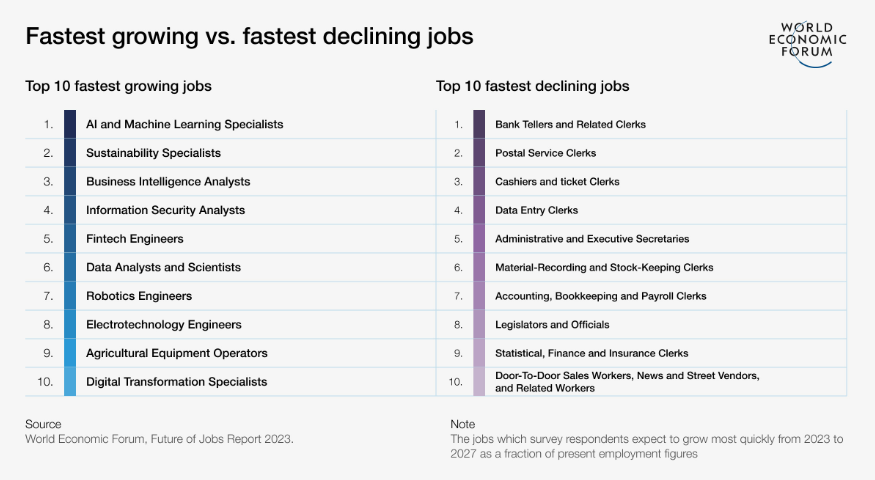[ad_1]
Artificial intelligence has been growing at an unprecedented rate in recent years and is being integrated into a range of industries. But its rapid growth has sparked concern over job losses, as many tasks previously performed by humans could soon be automated by AI.
For example, on May 1, IBM CEO Arvind Krishna told Bloomberg that 7,800 jobs at the firm could be replaced by AI and automation over the next five years, representing approximately 30% of its workforce.
While AI has the potential to improve efficiency, increase productivity and reduce costs, the rapid advancements seen in tools such as ChatGPT-4 — which represents a huge improvement on its predecessor, ChatGPT-3.5 — have many people concerned that their industry will be one of those hit hardest by related job losses.
ChatGPT and other large language models (LLMs) can already be used to complete a variety of tasks, such as generating smart contract code, handling community management, performing market analysis and more.
A research report from professional services firm Accenture released in March refers to the growing popularity of ChatGPT as “AI’s first true inflection point in public adoption,” adding:
“Nearly every job will be impacted — some will be eliminated, most will be transformed, and many new jobs will be created.”
Accenture’s research found that 40% of working hours across various industries could be affected by LLMs and identified banking as the industry most likely to be affected, as 54% of tasks were found to have a high potential for automation, closely followed by insurance at 48%.

Replacement and synthesis
Cointelegraph asked Gary Marcus, an AI entrepreneur and co-author of the book Rebooting AI: Building Artificial Intelligence We Can Trust, what he thought about AI’s impact on various industries.
Marcus suggested that commercial artists may be most at risk. “Commercial art” refers to branding, logos, advertising and graphic design — generally, art used for commercial purposes.
Commercial art is distinct from fine art, which refers to paintings, sculpture and photography — art that is more likely to be displayed at art museums such as the Louvre and is much harder for AI to create.
Marcus downplayed the prospect of job losses in the short term, however, noting that “in many cases, people will work together with machines, at least for [the] next several years.”
When asked how people can best future-proof their jobs to avoid being replaced by AI, Marcus replied: “It’s hard to know for sure, but I think that creative problem-solving skills and good critical thinking will remain valuable for a long time.”
The prospect of job losses due to AI is also something the World Economic Forum has been closely monitoring. It released its “Future of Jobs Report 2023” on April 30, which predicts that clerical or secretarial roles such as bank tellers and data entry clerks would be hit the hardest.

Echoing Marcus, the report indicates that higher-level skills such as analytical and creative thinking would be most in demand over the course of the next five years, and notes that the number-one training strategy for companies with more than 50,000 employees is to train their employees to efficiently use AI tools.
Job creation from AI
While the WEF report highlights that AI will likely replace many jobs, it notes that it will also create jobs and is merely contributing to an overall trend toward automation.
Accenture makes similar claims in its report, highlighting that many of the “language tasks” that could be automated by LLMs could be “transformed into more productive activity through augmentation and automation.”
A working paper released on March 27 by ChatGPT creator OpenAI and researchers from the University of Pennsylvania suggests that more hands-on professions such as cooks, mechanics and stonemasons were highly unlikely to be replaced by AI tools in the near future.
The paper also predicts that jobs that involved data or information processing, as well as those in the healthcare industry, are at much greater risk of automation, as programming and writing skills are more in line with the capabilities of LLMs like ChatGPT.
AI Eye: ‘Biggest ever’ leap in AI, cool new tools, AIs are the real DAOs
While the healthcare industry will still require many people for the more hands-on roles like nurses and surgeons, providers are increasingly using AI to analyze patient data, so many healthcare workers who are involved in data analysis could have their roles automated.
In all, there seems to be a consensus that clerical and other administrative roles will be the most heavily affected jobs over the next few years, and workers who are able to hone their creative/analytical thinking skills and become adept at using AI tools to boost their productivity will give themselves the best possible chance to not be replaced.
[ad_2]
Source link





